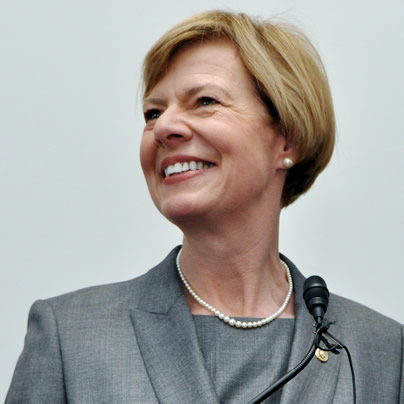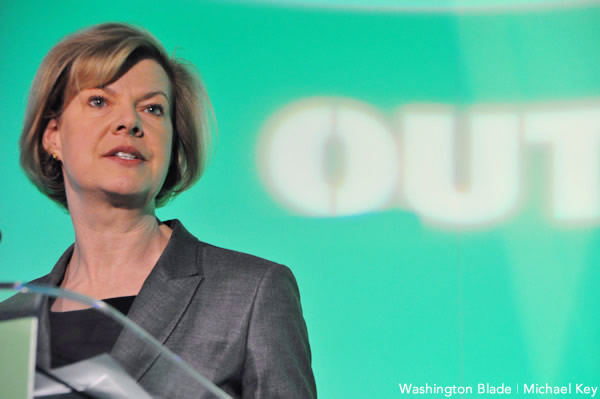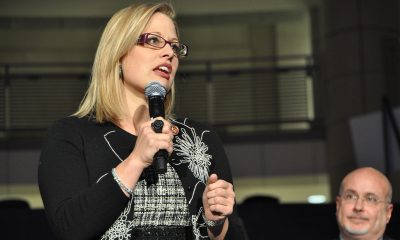Politics
Baldwin leads call for HHS to reevaluate gay blood ban
‘Our current policies turn away healthy, willing donors’


Sen. Tammy Baldwin (D-Wis.) is leading 85 lawmakers in a call for HHS to reevaluate its gay blood ban. (Washington Blade photo by Michael Key)
Lesbian Sen. Tammy Baldwin (D-Wis.) is leading a new effort to call on the Department of Health & Human Services for an update on the process with which reviewing its regulatory ban prohibiting gay and bisexual men from donating blood.
In a public letter dated Aug. 2, Baldwin as part of 86 members of the House and Senate asks Secretary of Health & Human Services Kathleen Sebelius for an update on the previously announced reevaluation of the policy, saying they’re “deeply concerned about the timeline of such research.”
“Our current policies turn away healthy, willing donors, even when we face serious blood shortages,” the letter states. “Further, the existing lifetime ban continues to perpetuate inaccurate stereotypes against gay and bisexual men, and fosters an atmosphere that promotes discrimination and discourages individuals from HIV testing and treatment services.”
Under current regulation, men who have had sex with other men since 1977 — even once — aren’t eligible to donate blood. The policy was set up administratively in 1985 at the height of the AIDS crisis, but could be overturned at any time without a change in law.
Others who have signed the bipartisan letter include Sens. Elizabeth Warren (D-Wis.) and Mike Enzi (R-Wyo.) as well as Reps. Mike Quigley (D-Ill.) and Barbara Lee (D-Calif.). Other signers are openly gay members of the U.S. House: Reps. Jared Polis (D-Colo.), David Cicilline (D-R.I.), Mark Pocan (D-Wis.), Sean Patrick Maloney (D-N.Y.) and Mark Takano (D-Calif.). Bisexual Rep. Kyrsten Sinema (D-Ariz.) isn’t yet a signer.
Baldwin supplemented the letter to the Department of Health & Human Services with a message via Twitter drawing attention to the current policy on gay blood donation.
Proud to lead 85 colleagues in Senate & House to ask @Sebelius to reevaluate discriminatory blood donation policy–TB http://t.co/M3gTFScjYs
— Sen. Tammy Baldwin (@SenatorBaldwin) August 2, 2013
The letter takes HHS to task for not moving quickly in the wake of announced plans to reevaluate existing policy. As the Washington Blade reported in 2010, the Advisory Committee on Blood Safety & Availability voted 9-6 against lifting the ban, but recommended additional research to support a change that would allow low-risk gay and bisexual men to donate.
According to the letter, HHS informed the committee last month that three studies are underway as well as a task force to help inform policy changes. The Quarantine Release Error Task Force is due to release a white paper this month, while the REDS-II, and Donor History Questionnaire studies are both scheduled to report results in October. The REDS-III study will be completed in August 2014.
The letter also notes, as the Washington Blade reported last year, HHS announced in March 2012 it’s seeking comments on a plan to design a pilot study to establish “alternative donor deferral criteria” that would enable gay and bisexual men to donate blood. Among the suggested changes is having them go through additional screening so they can be allowed to donate, although the notice admits such a policy may be seen as discriminatory.
According to the letter, HHS informed the Advisory Committee on Blood Safety & Availability that the RFI has received 11 responses to this proposal and a report to HHS senior leadership is scheduled for next month. According to public record, 10 responses were received from 10 different organizations, totaling 75 pages, including support documents.
The letter enumerates four things on which lawmakers seek clarity from HHS in reassessing blood donation criteria for men who have sex with men:
• The criteria used to assess the 75 pages of comments and what the assessment activities took place from June 2012 to July 2013;
• A copy of the July 2013 report to leadership on the response to the RFI on pilot study design;
• A detailed plan and a timeline for how results from the Quarantine Release Error Task Force, the Donor History Questionnaire Study; the REDS-II and REDS-III studies will be used to inform changes to the blood donation criteria; and
• Whether HHS plans to leverage data from other countries that currently allow MSM to donate to inform analysis of an alternative policy, and if not, why not.
In response to the letter, an HHS spokesperson pointed to the decision adopted by the Advisory Committee on Blood Safety & Availability in 2010 without providing an update on the research.
“The committee found the current donor deferral policies to be suboptimal in permitting some potentially high risk donations while preventing some potentially low risk donations, but voted in favor of retaining the existing policy, and identified areas requiring further research,” the HHS spokesperson said.
Shin Inouye, a White House spokesperson, deferred comment to HHS on the issue.
As noted in the letter, the American Medical Association in June adopted a resolution in opposition to the gay blood ban in favor of a policy that weighs individual risks other than sexual orientation.
AMA board member Dr. William Kobler at the time said the lifetime ban on gay blood donations “is discriminatory and not based on sound science.”
“This new policy urges a federal policy change to ensure blood donation bans or deferrals are applied to donors according to their individual level of risk and are not based on sexual orientation alone,” Kobler said.
Politics
After Biden signs TikTok ban its CEO vows federal court battle
“Rest assured, we aren’t going anywhere,” CEO said

President Joe Biden signed an appropriations bill into law on Wednesday that provides multi-billion dollar funding and military aid for Ukraine, Israel, and Taiwan after months of delay and Congressional infighting.
A separate bill Biden signed within the aid package contained a bipartisan provision that will ban the popular social media app TikTok from the United States if its Chinese parent company ByteDance does not sell off the American subsidiary.
Reacting, TikTok CEO Shou Zi Chew said Wednesday that the Culver City, Calif.-based company would go to court to try to remain online in the U.S.
In a video posted on the company’s social media accounts, Chew denounced the potential ban: “Make no mistake, this is a ban, a ban of TikTok and a ban on you and your voice,” Chew said. “Rest assured, we aren’t going anywhere. We are confident and we will keep fighting for your rights in the courts. The facts and the constitution are on our side, and we expect to prevail,” he added.
Our response to the TikTok Ban Bill in the US: https://t.co/LpoE67sxHo
— TikTokComms (@TikTokComms) April 24, 2024
White House Press Secretary Karine Jean-Pierre adamantly denied during a press briefing on Wednesday that the bill constitutes a ban, reiterating the administration’s hope that TikTok will be purchased by a third-party buyer and referencing media reports about the many firms that are interested.
Chew has repeatedly testified in both the House and Senate regarding ByteDance’s ability to mine personal data of its 170 million plus American subscribers, maintaining that user data is secure and not shared with either ByteDance nor agencies of the Chinese government. The testimony failed to assuage lawmakers’ doubts.
In an email, the former chair of the House Intelligence Committee, U.S. Rep. Adam Schiff (D-Calif.), who doesn’t support a blanket ban of the app, told the Washington Blade:
“As the former chairman of the House Intelligence Committee, I have long worked to safeguard Americans’ freedoms and security both at home and abroad. The Chinese Communist Party’s ability to exploit private user data and to manipulate public opinion through TikTok present serious national security concerns. For that reason, I believe that divestiture presents the best option to preserve access to the platform, while ameliorating these risks. I do not support a ban on TikTok while there are other less restrictive means available, and this legislation will give the administration the leverage and authority to require divestiture.”
A spokesperson for U.S. Sen. Alex Padilla (D-Calif.) told the Blade: “Senator Padilla believes we can support speech and creativity while also protecting data privacy and security. TikTok’s relationship to the Chinese Communist Party poses significant data privacy concerns. He will continue working with the Biden-Harris administration and his colleagues in Congress to safeguard Americans’ data privacy and foster continued innovation.”
The law, which gives ByteDance 270 days to divest TikTok’s U.S. assets, expires with a January 19, 2025 deadline for a sale. The date is one day before Biden’s term is set to expire, although he could extend the deadline by three months if he determines ByteDance is making progress or the transaction faces uncertainty in a federal court.
Former President Donald Trump’s executive order in 2020, which sought to ban TikTok and Chinese-owned WeChat, a unit of Beijing-based Tencent, in the U.S., was blocked by federal courts.
TikTok has previously fought efforts to ban its widely popular app by the state of Montana last year, in a case that saw a federal judge in Helena block that state ban, citing free-speech grounds.
The South China Morning Post reported this week that the four-year battle over TikTok is a significant front in a war over the internet and technology between Washington and Beijing. Last week, Apple said China had ordered it to remove Meta Platforms’s WhatsApp and Threads from its App Store in China over Chinese national security concerns.
A spokesperson for the ACLU told the Blade in a statement that “banning or requiring divestiture of TikTok would set an alarming global precedent for excessive government control over social media platforms.”
LGBTQ TikToker users are alarmed, fearing that a ban will represent the disruption of networks of support and activism. However, queer social media influencers who operate on multiple platforms expressed some doubts as to long term impact.
Los Angeles Blade contributor Chris Stanley told the Blade:
“It might affect us slightly, because TikTok is so easy to go viral on. Which obviously means more brand deals, etc. However they also suppress and shadow ban LGBTQ creators frequently. But we will definitely be focusing our energy more on other platforms with this uncertainty going forward. Lucky for us, we aren’t one trick ponies and have multiple other platforms built.”
Brooklyn, N.Y.,-based gay social media creator and influencer Artem Bezrukavenko told the Blade:
“For smart creators it won’t because they have multiple platforms. For people who put all their livelihood yes. Like people who do livestreams,” he said adding: “Personally I’m happy it gets banned or American company will own it so they will be less homophobic to us.”
TikTok’s LGBTQ following has generally positive experiences although there have been widely reported instances of users, notably transgender users, seemingly targeted by the platform’s algorithms and having their accounts banned or repeatedly suspended.
Of greater concern is the staggering rise in anti-LGBTQ violence and threats on the platform prompting LGBTQ advocacy group GLAAD, in its annual Social Media Safety Index, to give TikTok a failing score on LGBTQ safety.
Additional reporting by Christopher Kane
Politics
Smithsonian staff concerned about future of LGBTQ programming amid GOP scrutiny
Secretary Lonnie Bunch says ‘LGBTQ+ content is welcome’

Staff at the Smithsonian Institution are concerned about the future of LGBTQ programming as several events featuring a drag performer were cancelled or postponed following scrutiny by House Republicans, according to emails reviewed by the Washington Post.
In December, Secretary Lonnie G. Bunch III appeared before a hearing led by GOP members of the Committee on House Administration, who flagged concerns about the Smithsonian’s involvement in “the Left’s indoctrination of our children.”
Under questioning from U.S. Rep. Stephanie Bice (R-Okla.), Bunch said he was “surprised” to learn the Smithsonian had hosted six drag events over the past three years, telling the lawmakers “It’s not appropriate to expose children” to these performances.
Collaborations with drag artist Pattie Gonia in December, January, and March were subsequently postponed or cancelled, the Post reported on Saturday, adding that a Smithsonian spokesperson blamed “budgetary constraints and other resource issues” and the museums are still developing programming for Pride month in June.
“I, along with all senior leaders, take seriously the concerns expressed by staff and will continue to do so,” Bunch said in a statement to the paper. “As we have reiterated, LGBTQ+ content is welcome at the Smithsonian.”
The secretary sent an email on Friday expressing plans to meet with leaders of the Smithsonian Pride Alliance, one of the two groups that detailed their concerns to him following December’s hearing.
Bunch told the Pride Alliance in January that with his response to Bice’s question, his intention was to “immediately stress that the Smithsonian does not expose children to inappropriate content.”
“A hearing setting does not give you ample time to expand,” he said, adding that with more time he would have spoken “more broadly about the merits and goals of our programming and content development and how we equip parents to make choices about what content their children experience.”
Politics
Survey finds support for Biden among LGBTQ adults persists despite misgivings
Data for Progress previewed the results exclusively with the Blade

A new survey by Data for Progress found LGBTQ adults overwhelmingly favor President Joe Biden and Democrats over his 2024 rival former President Donald Trump and Republicans, but responses to other questions may signal potential headwinds for Biden’s reelection campaign.
The organization shared the findings of its poll, which included 873 respondents from across the country including an oversample of transgender adults, exclusively with the Washington Blade on Thursday.
Despite the clear margin of support for the president, with only 22 percent of respondents reporting that they have a very favorable or somewhat favorable opinion of Trump, answers were more mixed when it came to assessments of Biden’s performance over the past four years and his party’s record of protecting queer and trans Americans.
Forty-five percent of respondents said the Biden-Harris administration has performed better than they expected, while 47 percent said the administration’s record has been worse than they anticipated. A greater margin of trans adults in the survey — 52 vs. 37 percent — said their expectations were not met.
Seventy precent of all LGBTQ respondents and 81 percent of those who identify as trans said the Democratic Party should be doing more for queer and trans folks, while just 24 percent of all survey participants and 17 percent of trans participants agreed the party is already doing enough.
With respect to the issues respondents care about the most when deciding between the candidates on their ballots, LGBTQ issues were second only to the economy, eclipsing other considerations like abortion and threats to democracy.
These answers may reflect heightened fear and anxiety among LGBTQ adults as a consequence of the dramatic uptick over the past few years in rhetorical, legislative, and violent bias-motivated attacks against the community, especially targeting queer and trans folks.
The survey found that while LGBTQ adults are highly motivated to vote in November, there are signs of ennui. For example, enthusiasm was substantially lower among those aged 18 to 24 and 25 to 39 compared with adults 40 and older. And a plurality of younger LGBTQ respondents said they believe that neither of the country’s two major political parties care about them.
-

 State Department2 days ago
State Department2 days agoState Department releases annual human rights report
-

 Maryland4 days ago
Maryland4 days agoJoe Vogel campaign holds ‘Big Gay Canvass Kickoff’
-

 Politics3 days ago
Politics3 days agoSmithsonian staff concerned about future of LGBTQ programming amid GOP scrutiny
-

 The White House1 day ago
The White House1 day agoWhite House debuts action plan targeting pollutants in drinking water











